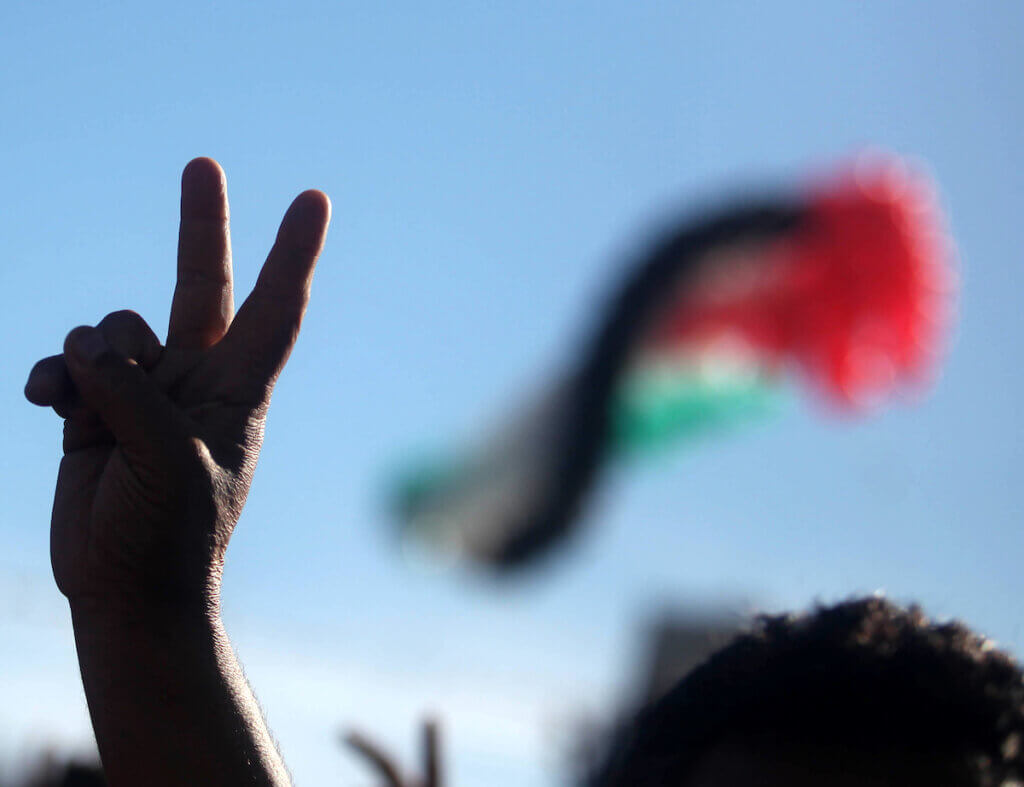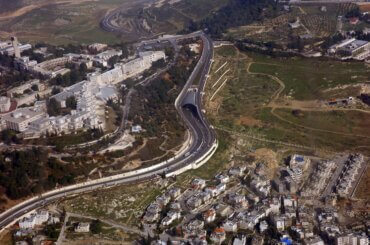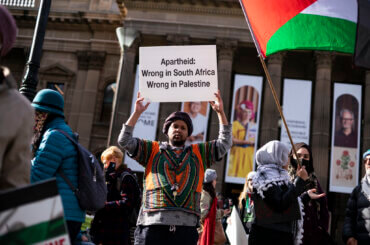GLORY TO GOD IN THE LOWEST
Journeys to an Unholy Land
by Donald E. Wagner
288 pp. Interlink Books, $20
The Rev. Don Wagner’s memoir of five decades as an activist leader and scholar on behalf of Palestinian rights is titled Glory to God in the Lowest: Journeys to an Unholy Land. That title might seem to signal a joke of some kind but in fact it celebrates how Wagner’s pursuit of liberation theology led him to the cause of a people uniquely wronged by Americans — their government, their media, and especially their churches — and to deep connection with the Palestinian spirit of resistance.
The memoir tells the story of a boy who just wanted to play baseball and be a good son and patriot, but who gradually opened up to the grim realities of war and racist violence. Each step down and away from the comforting myths of White American innocence and virtue brought Wagner into closer contact with an offbeat kind of glory. Born in 1942, he plunged into the 1960s civil rights and anti-war movements. Seeking truth and justice in the world, he was fueled by the example and liberating visions of MLK, the Berrigan brothers, Abraham Heschel, and others whose philosophies he studied at Princeton Seminary.
The young peacenik’s journey included some memorable episodes, such as when his loving, God-fearing mother physically attacked him, “freaked out” at the sight of him sporting long hair, bell bottoms and John Lennon shades; or when he played a tense one-on-one basketball contest with a Black Panther who turned into a key friend. The latter episode came in his first job out of seminary in a vibrant, mainly Black congregation in riot-torn Newark, N.J. That was the place where he entered for good into the reality and spirit of liberation struggles. The strongest epiphany came when he suddenly had to deal single-handedly with a massive crisis of overflowing toilets in the church men’s room. In his telling, it was during this abysmal moment that he realized the liberating power of the “downward journey” of solidarity that begets an unlimited “capacity to rise again.”
And yet, it would be several years before the Palestinian struggle was thrust upon him and his journey took its decisive turn. In October 1973, when Egypt launched the Yom Kippur War, Wagner had gone down on his knees to pray for Israel’s victory. But by the end of January 1974, his devotion to Israel had taken a mortal hit.
It happened in the Presbyterian church in Evanston, IL., where he had recently started as an assistant pastor. Israel had won the war, but the Israeli-Arab Conflict was still on Americans’ minds as the oil embargo of the “greedy Arabs” was pinching the public in their wallets and gas tanks. A church member urged that people should hear the Palestinian side of the story. Wagner was uneasy with that idea and argued against it, but he had to content himself with ensuring that the Israeli point of view would get equal time in any program. The first week, the church heard from the Israeli Consul General of the Midwest. In week two, Dr. Ibrahim Abu-Lughod, of Northwestern University, recounted how Zionist soldiers had driven his Palestinian family out of their home and country in 1948, along with a large majority of the entire Palestinian population — and how ethnic dispossession and domination had just gotten worse over the years.
“It was the first time I heard a clear . . . and compelling Palestinian narrative,” Wagner writes. “Why had I not heard about these grave injustices?” he wondered.
The next morning, a big part of the answer revealed itself, loud and angry on his telephone: a Jewish man from nearby Skokie was shouting at him, “You dignified a PLO terrorist yesterday in your church. Shame on you! Abu-Lughod is . . . a horrible anti-Semite and a PLO terrorist. If this shameful course is not stopped immediately, our organization will be picketing your church next Sunday.”

Wagner invited the caller to come the next Sunday and hear a man from the American Jewish Committee and to participate in the rest of the series. “No,” the caller said, “You need to tell me by Wednesday the course has been canceled.” He threatened to go to the media.
The threats continued but so did the series, including a talk by Dr. Hassan Haddad, a Syrian-American professor of history at St. Xavier University, and a fellow Presbyterian. He outlined the history of Zionism, including its debt to a pre-existing strain of Christian thought. This new information fascinated Wagner. Given his Christian Zionist upbringing, exploration of that theology shed new light on the flawed foundations of much traditional American Christian thinking, his family’s included. That started him on a lifelong study of Christian Zionism, about which he became a leading expert.
Wagner began reading voraciously on the Palestine issue, guided by his new friend and mentor, Professor Abu-Lughod. He had embarked on his life’s labor to understand and oppose the massive injustice in Israel-Palestine that made it the “Unholy Land” — a mission he would pursue as an activist, a scholar, and a professor on the politics and the politicized religion that drove the injustice.
He quickly became a key organizer and leader in the tiny movement within churches to get the truth out to Americans about the Palestinian struggle. Over time, he freed himself from church duties to work full-time for Palestinian human rights, traveling extensively, and making connections with many resistance leaders. At times, he found himself at the risky center of the struggle, witnessing historic events unfold on the ground and battling to engage with a hostile and intimidated media.
In late May 1982, Wagner led some Christian relief and development leaders on a trip to Lebanon. Rushing into Beirut, June 4, to meet with PLO Spokesman Mahmoud Labadi, the group was delayed by two members’ urgent need to stop for a bathroom break. Suddenly, out of the blue, bombs began exploding just a few blocks away. Israel was invading Lebanon, and the first target of its aerial assault was the PLO office where the group had been headed. After a series of bombing raids, the terrified group nonetheless kept a dinner date with officials at Red Crescent headquarters, another target for bombing. The director, Dr. Fathi Arafat (brother of PLO Chairman Yasser Arafat), told Wagner that, as rare American witnesses of the assault, their coming to dinner was more important than ever.
The next morning, while the group was visiting a hospital next to the Sabra-Shatila Camp for Palestinian refugees, ambulances began screaming in and unloading high school girls, some severely burned, some missing limbs, 19 of them already in body bags. Their UN buses, although clearly marked, had been bombed as they traveled the coastal road on a field trip. Desperate to get the news out, Wagner managed to get the NBC TV bureau chief, Mike Mallory, to do an in-depth interview with him. The segment never aired. As Mallory had warned might happen, “U.S. and Israeli censors had successfully filtered out the news,” a common problem. “Most of the television footage [in the U.S.] declared: ‘The following report has been approved by the Israeli Defense Forces for broadcast,’” Wagner writes.
Palestinian leaders urged him to go back to the U.S. and help “break the wall of silence.” His Chicago staff had lined up some media interviews, including a matchup with General Shromi of the IDF, who was on a national media tour and had successfully insisted that Wagner not be allowed in the TV studio to participate. “As the general concluded his opening remarks, he bellowed, ‘We believe Israel’s “Peace for Galilee” operation will be the final solution to the Palestinian problem.’” Wagner – forced to speak from a nearby park — seized on the genocidal Nazi phrase and recounted some of the war crimes he had just witnessed. The interview was cut off right after he asked, “is the General telling us the Jewish state is planning to exterminate the Palestinian people?” Gen. Shromi was promptly sent back to Israel.
As he gained media attention in the U.S., Wagner had a man pull a gun on him (the assailant was quickly restrained), and a young AIPAC staffer named Wolf Blitzer crossed swords with him in a broadcast debate. The future CNN sage was pressed so hard by Wagner’s eyewitness testimony that all he could do was call him antisemitic.
With the horrors of the siege of Beirut continuing through the summer, Wagner returned there on Sept. 18, just as the three-day, Israeli-sponsored massacre of Palestinians in the Sabra and Shatila Refugee Camp ended. Rushed to the camp, he was among the first Westerners to see the carnage and to talk to survivors, including a Muslim imam, who told Wagner that, as an American, the blood was on his hands. In the next breath, the imam thanked Allah that Wagner had come and charged him to “go back and tell the truth.”
Five years later, Wagner witnessed the eruption of the First Intifada. He had hurried from his then-home in Cyprus as soon as the protests blossomed across the Occupied Territories — and kept blossoming. Palestinian friends in East Jerusalem, who were providing daily information on the Intifada, had him go with the “field workers” on their covert travels to key locations. “The level of coordination and sacrificial suffering among Palestinians was unlike anything we had seen,” he writes.
While in the Holy Land, he also met Rev. Naim Ateek, an Anglican priest at St. George’s Cathedral, who had recently launched post-worship discussion groups that connected the day’s Biblical texts and sermons to “justice and the need for involvement in the Intifada.” The sessions were the catalyst and a defining element of Ateek’s Palestinian Liberation Theology, and of the Sabeel Ecumenical Liberation Theology Center, which he founded in Jerusalem. The center soon gained followers and sister organizations around the world.
Wagner became close friends with Ateek and a major force in Friends of Sabeel North America. The affinity was no surprise: Ateek was developing a new branch of liberation theology akin to the ones that had liberated Wagner, as a young man, from his family’s God-and-country outlook on war, race, poverty, and materialism.
In bonding with the struggle of the beleaguered but indomitable Palestinians, Wagner has had access to the spiritual wellspring of resilience in the face of hardship that they call sumud (steadfastness). The word that Naim Ateek chose to express his theology of liberation is sabeel, which means a way or a water source. For Wagner, sabeel and sumud have sustained his faith in a transcendent God who was born in a lowly cave in Bethlehem and identified with the outcast and oppressed.
Wagner is not an optimist, however. How could he be, having seen those dying high school girls and the decomposing dead of Sabra and Shatila 40 years ago, whom his country and the powers of the world still have never mourned? He has shared the endlessly dashed hopes of Palestinians for almost 50 years. In concluding his memoir, he admits that it’s “difficult to remain hopeful.”
And yet, his journey to an “Unholy Land” began in a time when even Amnesty International in the U.S. refused to touch Palestinian cases. Now, thanks to decades of collective effort, the movement for Palestinian human rights has grown to where Amnesty USA is campaigning to end Israeli apartheid. Despite the continuing tragedy of Palestine, Don Wagner is not down. In fact, he exudes a humble, cheerful charisma that imparts to those around him – and now to his readers – a touch of the “glory of God in the lowest” that defines his life. Neither he, nor many of his readers are likely to witness the liberation of Palestine (and Israel), but it is woven into this well-told story of his life.



